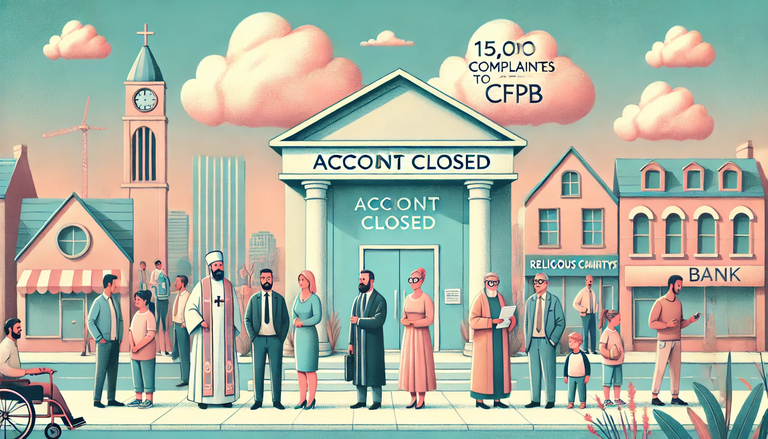In recent years, a troubling trend has emerged in the American financial landscape known as debanking.
This phenomenon refers to the practice where financial institutions sever ties with customers deemed politically controversial or high-risk. The implications of this trend are profound, affecting not only individuals but also the broader economy.

The process of banking or debanking affects a wide range of individuals and organizations
The Origins of Debanking
The roots of debanking can be traced back to the post-9/11 era when the U.S. government enacted the Patriot Act. This legislation significantly expanded surveillance powers and mandated that banks monitor their customers for suspicious activities. Initially aimed at preventing terrorism, these measures have increasingly been directed at domestic political targets. Over time, banks began to adopt a more cautious approach, often choosing to cut ties with customers who might pose a reputational risk.
One striking example is the case of Chris Abdur-Rahman Blauvelt, founder of the crowdfunding platform LaunchGood. In 2019, Blauvelt learned that Stripe, his payment processor, was terminating their relationship due to "increased scrutiny" from financial partners. Despite LaunchGood's mission to fund humanitarian efforts for Muslim charities worldwide, the platform was deemed too risky. Blauvelt's experience highlights how even well-intentioned organizations can find themselves on the wrong side of financial institutions due to political biases.
This trend is not isolated; it affects a wide range of individuals and organizations. From former First Lady Melania Trump to various Christian charities and Muslim organizations, many have experienced sudden account closures without clear explanations. The Consumer Financial Protection Bureau (CFPB) has received over 15,000 complaints since 2016 regarding abrupt account terminations, indicating that this issue is widespread and growing.
The Implications for Society and Investors
The consequences of debanking extend beyond individual hardships; they pose significant risks to society as a whole. When financial institutions begin monitoring customers based on political beliefs or affiliations, it creates an environment of fear and self-censorship. People may hesitate to express their views or support certain causes for fear of losing access to essential banking services.
For investors, this trend introduces a new layer of risk. Companies that are thriving today could find themselves financially crippled tomorrow due to arbitrary decisions made by banks. The lack of transparency surrounding these decisions further complicates matters, as individuals and organizations often have no recourse or explanation when their accounts are terminated.
Moreover, the economic ramifications extend beyond individual consumers. Debanking can undermine the stability of communities reliant on remittances or charitable contributions from organizations that have been cut off from financial services. Lawmakers from both sides of the aisle are increasingly concerned about this issue; prominent figures like Senators Elizabeth Warren and Bernie Sanders have voiced their worries about the disproportionate impact on Muslim Americans and other marginalized groups.
Cryptocurrency: A Path Forward
As traditional banking systems grapple with these challenges, many are looking towards cryptocurrency as a potential solution. Decentralized finance (DeFi) platforms offer an alternative that operates outside the purview of traditional financial institutions. By leveraging blockchain technology, these platforms provide financial services without the risk of politically motivated account closures.
Cryptocurrency can enhance financial inclusion by offering banking services to those who have been debanked or marginalized by conventional banks. Moreover, the transparency inherent in blockchain technology could help mitigate concerns over arbitrary decision-making by financial institutions.
However, transitioning to a crypto-based system is not without its challenges. Regulatory uncertainty remains a significant hurdle; governments are still grappling with how to regulate cryptocurrencies effectively without stifling innovation. Additionally, the volatility associated with many cryptocurrencies can deter users who seek stability in their financial transactions.
To build an ideal financial system through crypto while addressing its weaknesses, several steps can be taken:
Regulatory Clarity: Clear regulations surrounding cryptocurrency use can foster trust and encourage adoption while protecting consumers.
Hybrid Models: Developing hybrid systems that combine traditional banking safeguards with decentralized principles could provide a balanced approach.
Education and Awareness: Increasing public understanding of cryptocurrency and its benefits can empower individuals to explore alternative financial solutions.
Enhanced Security Measures: Implementing robust security protocols within crypto platforms can help protect users from fraud and theft.
Advocacy for Financial Privacy: Supporting legislation like the Saving Privacy Act could help protect consumers from unwarranted surveillance by banks.
Wrap-Up
The debanking trend in America poses significant challenges for individuals and society at large. As we witness increasing politicization within our financial systems, it is crucial to advocate for transparency and fairness in banking practices. Cryptocurrency offers promising solutions but requires careful implementation and regulation to ensure its benefits are realized without compromising security or stability.
As investors and citizens, we must remain vigilant about these developments and engage in discussions about creating a more inclusive and resilient financial ecosystem—one that respects individual rights while fostering economic participation for all Americans.
¡Queremos leerte!
Entra y publica tus artículos con nosotros.
Vota por el witness @cosmicboy123